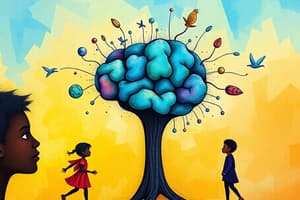Podcast
Questions and Answers
What is the primary focus of Erik Erikson's theory?
What is the primary focus of Erik Erikson's theory?
- Cognitive development in adults
- Physical development during childhood
- Social and cultural influences on personality (correct)
- Biological factors in personality formation
In the first stage of psychosocial development, what is the central goal?
In the first stage of psychosocial development, what is the central goal?
- Attaining independence from caregivers
- Exploring different social roles
- Developing a sense of trust (correct)
- Achieving self-identity
What outcome may occur if the Trust vs. Mistrust stage is not successfully navigated?
What outcome may occur if the Trust vs. Mistrust stage is not successfully navigated?
- High self-esteem and resilience
- Confidence in new relationships
- Sense of beauty and purpose
- Feelings of fear and anxiety (correct)
Which of the following aspects of the ego involves experiences with our physical self?
Which of the following aspects of the ego involves experiences with our physical self?
What is the core pathology associated with unsuccessful navigation of the Trust vs. Mistrust stage?
What is the core pathology associated with unsuccessful navigation of the Trust vs. Mistrust stage?
Who played a significant role in convincing Erikson to pursue psychoanalysis?
Who played a significant role in convincing Erikson to pursue psychoanalysis?
What is the virtue that develops successfully during the Trust vs. Mistrust stage?
What is the virtue that develops successfully during the Trust vs. Mistrust stage?
Which of the following best describes the role of the ego in Erikson's theory?
Which of the following best describes the role of the ego in Erikson's theory?
What must children achieve during the Initiative vs. Guilt stage?
What must children achieve during the Initiative vs. Guilt stage?
What effect can failure to establish competence in early development have on a child?
What effect can failure to establish competence in early development have on a child?
Which virtue is developed during the Initiative vs. Guilt stage?
Which virtue is developed during the Initiative vs. Guilt stage?
What is one potential outcome of success in the Initiative vs. Guilt stage?
What is one potential outcome of success in the Initiative vs. Guilt stage?
Which of the following is a core pathology identified in the context of identity development?
Which of the following is a core pathology identified in the context of identity development?
What characterizes the Identity Cohesion vs. Role Confusion stage?
What characterizes the Identity Cohesion vs. Role Confusion stage?
What is a possible effect of guilt during the Initiative vs. Guilt stage?
What is a possible effect of guilt during the Initiative vs. Guilt stage?
How can positive reinforcement impact a child's development during the Initiative vs. Guilt stage?
How can positive reinforcement impact a child's development during the Initiative vs. Guilt stage?
What is the result of caregivers adopting a discouraging or dismissive approach towards children?
What is the result of caregivers adopting a discouraging or dismissive approach towards children?
What is characterized by an extreme lack of self-trust or self-confidence?
What is characterized by an extreme lack of self-trust or self-confidence?
During which stage do individuals prioritize finding a loved one?
During which stage do individuals prioritize finding a loved one?
What is the potential outcome of failing to adapt to social and academic demands in childhood?
What is the potential outcome of failing to adapt to social and academic demands in childhood?
What virtue is acquired when a child successfully adapts to new demands during the Industry vs. Inferiority stage?
What virtue is acquired when a child successfully adapts to new demands during the Industry vs. Inferiority stage?
What is the primary focus of the Autonomy vs Shame & Doubt stage in early childhood?
What is the primary focus of the Autonomy vs Shame & Doubt stage in early childhood?
What outcome results from a child's success in the Autonomy vs Shame & Doubt stage?
What outcome results from a child's success in the Autonomy vs Shame & Doubt stage?
What may the feelings of guilt stem from according to the content provided?
What may the feelings of guilt stem from according to the content provided?
What do individuals assess during the Ego Integrity vs. Despair stage of life?
What do individuals assess during the Ego Integrity vs. Despair stage of life?
What is the core pathology associated with failure in the Autonomy vs Shame & Doubt stage?
What is the core pathology associated with failure in the Autonomy vs Shame & Doubt stage?
Which of the following is NOT a consequence of successful relationships in the Intimacy vs. Isolation stage?
Which of the following is NOT a consequence of successful relationships in the Intimacy vs. Isolation stage?
How can inadequate support from parents affect a child's development?
How can inadequate support from parents affect a child's development?
What basic strength develops if a child is well-motivated to succeed in school?
What basic strength develops if a child is well-motivated to succeed in school?
What negative outcome may occur if children aren't encouraged during their early development?
What negative outcome may occur if children aren't encouraged during their early development?
Which event is significant during the Autonomy vs Shame & Doubt stage?
Which event is significant during the Autonomy vs Shame & Doubt stage?
What may lead to a child developing a sense of compulsion?
What may lead to a child developing a sense of compulsion?
What is the primary focus of the developmental task in Stage 7: Generativity vs. Stagnation?
What is the primary focus of the developmental task in Stage 7: Generativity vs. Stagnation?
Which of the following best describes the core pathology of rejectivity?
Which of the following best describes the core pathology of rejectivity?
What is the basic strength that emerges from a balanced interaction between generativity and stagnation?
What is the basic strength that emerges from a balanced interaction between generativity and stagnation?
What feeling is commonly associated with despair during the developmental stage of middle adulthood?
What feeling is commonly associated with despair during the developmental stage of middle adulthood?
Which phrase best describes stagnation in the context of adulthood?
Which phrase best describes stagnation in the context of adulthood?
What can result from the extreme expression of despair and self-comparison at this developmental stage?
What can result from the extreme expression of despair and self-comparison at this developmental stage?
What results from a state of disdain according to the content?
What results from a state of disdain according to the content?
Which of the following is NOT related to the concept of generativity?
Which of the following is NOT related to the concept of generativity?
Flashcards are hidden until you start studying
Study Notes
Erik Erikson's Theory of Psychosocial Development
- Erikson's psychosocial theory expanded upon Freud's psychoanalytic theory by looking at how people develop throughout their lives, encompassing childhood, adulthood, and old age.
- Erikson's theory emphasizes social and cultural influences on personality development.
- He believed that the ego is a force that creates self-identity, unifies personality, and guards against indivisibility.
- The ego integrates experiences and actions in an adaptive manner, with three interrelated aspects:
- Body Ego: Experiences related to our physical self.
- Ego Ideal: Our image of ourselves based on our established ideal self.
- Ego Identity: The image we have of ourselves within the different social roles we play.
- Erikson identified eight stages of psychosocial development, each with a specific crisis and virtual strength to achieve:
Stages of Psychosocial Development
Stage 1: Trust vs. Mistrust (Infancy, Birth to 18 Months)
- The central goal of this stage is to develop a sense of trust in the world through caregiver's ability to meet basic needs and provide comfort.
- Successful completion of this stage results in the virtue of hope.
- Failure can lead to feelings of fear, anxiety, and a perception of the world as unsafe and unpredictable.
- Basic Strength: Hope - The ability to face new challenges with anticipation.
- Core Pathology: Withdrawal - Difficulty trusting in others and feeling safe in the environment.
Stage 2: Autonomy vs Shame & Doubt (Early Childhood, 1-3 Years Old)
- The goal in this stage is to gain personal control over physical skills and achieve a sense of independence.
- Major milestones include toilet training and dressing.
- Successful completion of this stage leads to a sense of autonomy and the virtue of will.
- Failure can result in shame and doubt.
- Basic Strength: Will - The ability to assert oneself and make independent choices.
- Core Pathology: Compulsion - A lack of self-control and an overreliance on others.
Stage 3: Initiative vs. Guilt (Preschool or Toddlers, 3-5 Years Old)
- The focus is on asserting control over the environment, taking initiative, and planning for the future.
- Key events include playing and exploring.
- Successful resolution of this stage results in the virtue of purpose.
- Failure leads to feelings of guilt and insecurity.
- Basic Strength: Purpose - The ability to make plans, set goals, and take initiative.
- Core Pathology: Inhibition - A tendency to be overly cautious and avoid taking risks.
Stage 4: Industry vs. Inferiority (School Age, 6-12 Years Old)
- Children must adapt to school demands and develop a sense of competency.
- Teachers play a significant role in nurturing a child's development during this stage.
- Success leads to competence and industriousness.
- Failure leads to feelings of inferiority.
- Basic Strength: Competence - The ability to be productive and contribute to society.
- Core Pathology: Inertia - A lack of motivation and confidence in one's abilities.
Stage 5: Identity Cohesion vs. Role Confusion (Adolescence, 12-18 Years Old)
- A critical stage of rapid change.
- The main focus is on forming a strong sense of self-identity, integrating ideas about ourselves and how others perceive us.
- Successful completion of this stage results in the virtue of fidelity.
- Failure leads to role confusion and a weak sense of self.
- Basic Strength: Fidelity - The ability to commit to beliefs and values.
- Core Pathology: Role Repudiation - A lack of self-trust, characterized by diffidence (shyness and hesitancy) or defiance (rebellion against authority).
Stage 6: Intimacy vs. Isolation (Young Adulthood, 19-40 Years Old)
- Focusing on finding a loving partner and forming intimate relationships.
- Success leads to the development of strong, committed relationships.
- Failure results in feelings of isolation and loneliness.
- Basic Strength: Love - The ability to form deep, meaningful connections with others.
- Core Pathology: Exclusivity - The inability to commit to or engage in intimate relationships.
Stage 7: Generativity vs. Stagnation (Middle Adulthood, 40-65 Years Old)
- The goal is to contribute to society, establish a family, and raise children.
- Successful completion of this stage leads to the virtue of care.
- Failing to contribute to society or create something lasting leads to stagnation and feelings of emptiness.
- Basic Strength: Care - The ability to nurture and guide others.
- Core Pathology: Rejectivity - A lack of concern for others and a sense of detachment.
Stage 8: Ego Integrity vs. Despair (Maturity, 65-Death)
- This stage involves reflecting on life and evaluating whether it has been meaningful.
- Individuals who achieve ego integrity have a sense of fulfillment and wisdom.
- Those who fail to achieve ego integrity experience despair and regret.
- Basic Strength: Wisdom - The ability to accept life's journey, both its joys and sorrows.
- Core Pathology: Disdain - A sense of bitterness and contempt for life and its experiences.
Studying That Suits You
Use AI to generate personalized quizzes and flashcards to suit your learning preferences.




